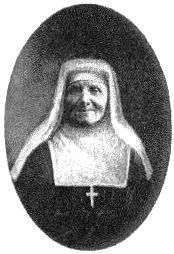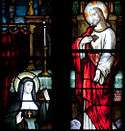Marie Martha Chambon

Marie Martha Chambon (March 6, 1841 – March 21, 1907) was a lay Roman Catholic nun known for introducing the Rosary of the Holy Wounds.[1]
Biography
Françoise Chambon was born March 6, 1841 to a poor farming family in the village of Croix Rouge, near Chambéry, in Savoy. Her first reported vision occurred when she was nine years old. As she was attending Good Friday services with her godmother, in the parish church of Lémenc, Françoise saw the crucified Jesus covered in wounds and blood. She said that later that year, when she received First Communion, she saw the baby Jesus,who told her, ""Child, my favorite, so it will be every time you go to Holy Communion."[2]
At the age of twenty-one, she joined the Monastery of the Visitation Order in Chambéry, France as a lay sister, and was given he name Marie-Marthe.[3]
She died on March 21, 1907, and the cause for her beatification was introduced in 1937.
Private revelations
She began to report visions of Jesus in 1866, telling her to contemplate the Holy Wounds.[4] These were visions of Jesus Christ appearing to her and teaching her specific prayers and meditations on His wounds.[5] She reported that she was told to pray to and invoke the Holy Wounds unceasingly.[6]
Her mother superior kept a chronicle of her life which was published in 1923 and sold widely. The next year the Vatican granted an indulgence to those who said the following prayer, based on her reported visions: "Eternal Father I offer the wounds of Our Lord Jesus Christ, to heal those of our souls."[4]
She reported that Jesus asked her to unite her sufferings with His in the Rosary of the Holy Wounds as an Act of Reparation for the sins of the world.[7] She reported that Jesus told her that "[w]hen you offer My Holy Wounds for sinners, you must not forget to do so for the souls in Purgatory, as there are but few who think of their relief... The Holy Wounds are the treasure of treasures for the souls in Purgatory."[8]
Holy Wounds devotion
According to Ann Ball, Chambon was told to revive the Holy Wounds devotion.[5] Part of this devotion can be a Chaplet of Mercy of the Holy Wounds of Jesus, which was based on Chambon's private revelations.[5] This chaplet was approved for the Institute of Visitation in 1912, and was extended to all the faithful at large by the Sacred Penitentiary in 1924.[5] According to Liz Kelly, the Rosary of the Holy Wounds was revealed to Chambon and is prayed on a standard five decade rosary.[9]
Format of the Chaplet
The chaplet consists of three prayers that are said on specific portions of the rosary beads as follows:[1]
- The following prayers are said on the crucifix and first three beads:
- O Jesus, Divine Redeemer, be merciful to us and to the whole world. Amen.
- Holy God, Mighty God, Immortal God, have mercy on us and on the whole world. Amen
- Grace and Mercy, O my Jesus, during present dangers; cover us with Your Precious Blood. Amen.
- Eternal Father, grant us mercy through the Blood of Jesus Christ, Your only Son; grant us mercy we beseech You. Amen, Amen, Amen.
- The following prayer is said on the large beads of the rosary chain:
- Eternal Father, I offer You the Wounds of Our Lord, Jesus Christ, to heal the wounds of our souls.
- The following prayer is said on the small beads of the rosary chain:
- My Jesus, pardon and mercy, through the merits of Your Holy Wounds.
See also
Notes
- 1 2 The Rosary: A Path Into Prayer by Liz Kelly 2004 ISBN 0-8294-2024-X page 162
- ↑ "Marie-Marthe Chambon", The Passinists of southern Germany and Austria
- ↑ Freze, Michael. 1993, Voices, Visions, and Apparitions, OSV Publishing ISBN 0-87973-454-X p. 252
- 1 2 Williams, David (2004). The Five Wounds of Christ. Gracewing Publishing. p. 28. ISBN 0-85244-620-9. page 80
- 1 2 3 4 Ball, Ann (2003). Encyclopedia of Catholic Devotions and Practices. Our Sunday Visitor Publishing. pp. 121, 245. ISBN 0-87973-910-X.
- ↑ Geoghegan, G. P. (2006). A Collection of My Favorite Prayers Lulu.com. ISBN 1-4116-9457-0 page 80
- ↑ Freze.
- ↑ Geoghegan, p.53.
- ↑ Kelly, Liz (2006). May Crowning, Mass, and Merton: And Other Reasons I Love Being Catholic. Loyola Press. pp. 143–144. ISBN 0-8294-2025-8.
References
- Freze, Michael. 1993, Voices, Visions, and Apparitions, OSV Publishing ISBN 0-87973-454-X
- Geoghegan, G. P., A Collection of My Favorite Prayers, 2006, Lulu.com, ISBN 1-4116-9457-0
- Kerr, Anne Cecil (1937). Sister Mary Martha Chambon of the Visitation. B. Herder Publishing.
